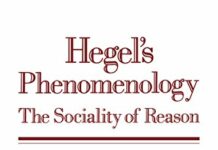
Ebook Info
- Published: 1988
- Number of pages: 236 pages
- Format: PDF
- File Size: 24.21 MB
- Authors: Terry Pinkard
Description
Hegel is one of the most often cited and least read of all major philosophers. He is alternately regarded as the best and the worst that philosophy has produced. Nobody, however, disputes his influence. In Hegel’s Dialectic, Terry Pinkard offers a new interpretation of Hegel’s program that assesses his conception of the role of philosophy, his method, and some of the specific theses that he defended. Hegel’s dialectic is interpreted as offering explanations of the possibility of basic categories. Pinkard argues that the traditional standard reading of Hegel as the esoteric metaphysician of Absolute Spirit overlooks major elements of his thought. In presenting this alternative reading of Hegel, Pinkard offers a new understanding of the role of history in Hegel’s thought and a new perspective on his moral and political thought. Departing from the tradition of explicating Hegel exclusively in Hegelian terms, Pinkard discusses the much disputed philosopher in a way that is accessible and appealing to both analytic and non-analytic philosophers. Hegel’s Dialectic is not just an interpretation of Hegel’s thought: it is also a reconstruction and defense of Hegel’s philosophy as having something of importance to say to late twentieth-century philosophers.
User’s Reviews
Reviews from Amazon users which were colected at the time this book was published on the website:
⭐The Science of Logic is Hegel’s ultimate attempt to explicate his system of the evolution of “reason” and the concepts developed by reason to bring together or align the subjectivity of human experience and the objectivity of reality. Hegel’s post Kantian idealism (meaning essentially an emphasis on the possibility that some capacity of the mind can best grasp reality) intends to in part overcome the Kantian dualism of human experience (the “phenomenal” realm) and reality (the “noumenal” realm) of the “thing-in-itself” which, according to Kant, can never be known. Hegel does this through what he proposes as a dialectically “logical” progression through categories beginning with the presuppositionless category of “pure being”, leading inexorably to the category of determinate being and on to different levels of complexity (like a video game in a way) to his denouement of the final chapter of human logical development when the human mind finally “determines” the real- or realizes its destiny and becomes one with reality.Pinkard, in a very short book, does a remarkable job of outlining and criticizing Hegel’s arguments without getting bogged down in the obscurantism that Hegel brought to his project (including the dense verbal exposition). For such a short book it gives the reader an excellent understanding of what Hegel was trying to say and, with an open mind and a little thought on the reader’s part, he/she will understand the timeless relevance of The Science of Logic and its contribution to the progress of human thought on the topic of what we might know as finite, limited beings about the structure of the real world.
⭐
Keywords
Free Download Hegel’s Dialectic: The Explanation of Possibility in PDF format
Hegel’s Dialectic: The Explanation of Possibility PDF Free Download
Download Hegel’s Dialectic: The Explanation of Possibility 1988 PDF Free
Hegel’s Dialectic: The Explanation of Possibility 1988 PDF Free Download
Download Hegel’s Dialectic: The Explanation of Possibility PDF
Free Download Ebook Hegel’s Dialectic: The Explanation of Possibility




